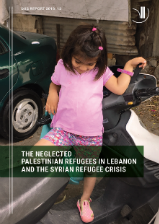Deteriorating conditions for refugees might destabilize Lebanon
Consequences of the Syrian refugee crisis for the Palestinians in Lebanon
Joint publication from Institute for Migration Studies, LAU, and Danish Institute for International Studies (DIIS)
Based on fieldwork in Lebanon a new report focuses on how the Palestine refugees living in camps since 1948 perceives the new situation and which consequences the crisis has for their living conditions: How are the Palestinians affected by the influx of about 1.5 million Syrian Refugees? What are the consequences for the Palestinians’ position in Lebanese society now they have become the “old” refugees? Has the crisis changed the identity of the Palestinians in Lebanon?
The fieldwork carried out in early 2016 reveals how many of the Syrian refugees stay unregistered in Lebanon; hiding themselves from the authorities in poor areas or the existing Palestinian refugee camps. They take underpaid jobs, often in conflict with regulations and for even lower pay than the Palestinians or poor Lebanese citizens, leading to social dumping and potential social unrest.
Many of the approx. 53.000 Palestinians from Syria among the refugees are placed in the existing Palestine camps, putting further stress on the

camps, which are already struggling with limited budgets. Poor water supplies, unreliable power supplies, inefficient disposal of garbage and very limited space. As the expenses for housing, schools and healthcare increase it is clear the crisis has led to a decrease in services in the camps and Palestine refugees see themselves somehow forgotten or even neglected.
The younger generations are especially conscious of this and have low expectations of the future.
This report looks at risks for social unrest and destabilization and presents the findings from the fieldwork of both the attitudes of the inhabitants in the camps and the activities of the Palestinian factions. The report also discusses limitations of the “countering violent extremism” programs that are increasingly being used by Western countries including Denmark.
The report is written by DIIS researcher Lars Erslev Andersen and is a joint publication with the Institute for Migration Studies, Lebanese American University (LAU) in Beirut, where he was affiliated in the spring of 2016.
Click here to read the report.